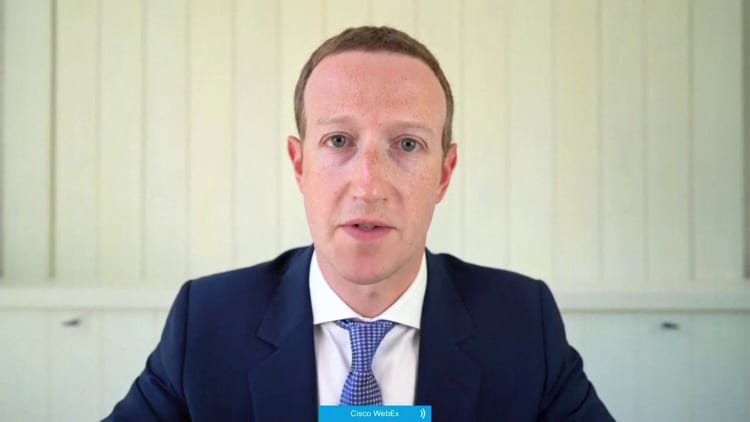Five and half hours of testimony with four of the most powerful CEOs in the world. Lots of shouting. The richest man on the planet forgot to unmute before speaking on a video call.
What'd we learn during the Big Tech CEO hearing on Wednesday?
Next to nothing.
But luckily for us, even if much of the House Judiciary subcommittee on antitrust seemed distracted by online conspiracy theories and incoherent lines of questioning, it still did a lot of the good and dirty work over the last year, gathering over 1 million documents from Apple, Amazon, Facebook and Google in its antitrust probe against the companies. These documents build a far better antitrust case against the four tech giants than anything the CEOs said during the hearing.
The trove of documents, released Wednesday night after the hearing ended, provides juicy details such as how Facebook CEO Mark Zuckerberg said he wanted to buy Instagram at least in part to squash a rising competitive threat and how Amazon CEO Jeff Bezos negotiated a sweetheart deal with Apple to get Amazon's Prime Video app on Apple TV.
The Amazon-Apple deal was particularly interesting. The two companies had been at a stalemate since 2016 or so, after Apple opened up Apple TV to all third-party video apps. But Amazon was notably missing from Apple TV, and the documents released Wednesday reveal that was because Amazon didn't want to pay Apple the standard 30% cut of its sales through Apple's platform.
So Bezos met with Apple's VP in charge of Apple TV, Eddy Cue, and negotiated a 15% cut instead. Shortly after that agreement was made, Amazon also began selling Apple products.
That contradicts Tim Cook's testimony yesterday, when he said Apple treats all apps equally. According to the emails, Amazon got special treatment from Apple that other apps didn't. (Today, Apple takes a 30% cut of subscription fees through its platform for the first year and 15% after that.)
It didn't stop there with Amazon.
About a decade ago, Amazon was in steep competition with a rising e-commerce company called Quidsi, which operated Diapers.com and Soap.com. The documents show that Amazon intentionally lowered prices of diapers on its site in order to weaken Quidsi.
"We have already initiated a more aggressive 'plan to win' against diapers.com," one Amazon executive wrote in an email released by the subcommittee. "To the extent that this plan undercuts the core diapers business for diapers.com, it will slow the adoption of Soap.com."
And another Amazon email said: "[T]hese guys are our #1 short term competitor... [W]e need to match pricing on these guys no matter what the cost."
After that, Amazon ended up buying Quidsi for about $500 million. Amazon shut down Quidsi almost seven years later. Quidsi didn't have much of a chance to make it on its own due to the pricing pressure caused by its larger competitor Amazon.
As for Facebook, the documents show that its $1 billion acquisition of Instagram in 2012 was at least in part due to Zuckerberg's desire to quash a buzzy and growing competitor. (Zuckerberg argued in his testimony Wednesday that there was no guarantee Instagram would be a success back then, and that its position today as a dominant social media app is because it had Facebook's endless resources to work with.)
But in emails with then-CFO David Ebersman, Zuckerberg discussed the advantages of buying Instagram. Zuckerberg agreed with Ebersman that acquiring Instagram would help "neutralize a potential competitor."
"Instagram can hurt us meaningfully without becoming a huge business," Zuckerberg wrote in another email released Wednesday.
That plays right into one of the remedies that have been proposed against Facebook: Split the company up by separating Facebook from other major apps it has acquired, Instagram and WhatsApp.
That's just a taste. There are plenty more documents that were released Wednesday to dig through. They'll make a great beach read for any antitrust dorks out there.
Even if you're not confident that the House antitrust subcommittee's upcoming report on the four giants will lead to any passable legislation by a fractured and bitter Congress, we now have fresh insight into Big Tech's dealings behind the scenes as the four giants grew into dominant forces in the global economy over the last decade.
And it doesn't end with Congress. The DOJ, FTC and groups of state attorneys general are all investigating these four companies to varying degrees. Those investigations are more likely to result in immediate action without waiting for Congress, which has yet to pass a single piece of significant tech regulation since the "techlash" began a few years ago.
As expected, Wednesday's hearing made for some spectacular political theater with no substance. But the government has the goods on Apple, Amazon, Facebook and Google, and these documents should go a long way if and when any action is taken against those Big Tech companies.



